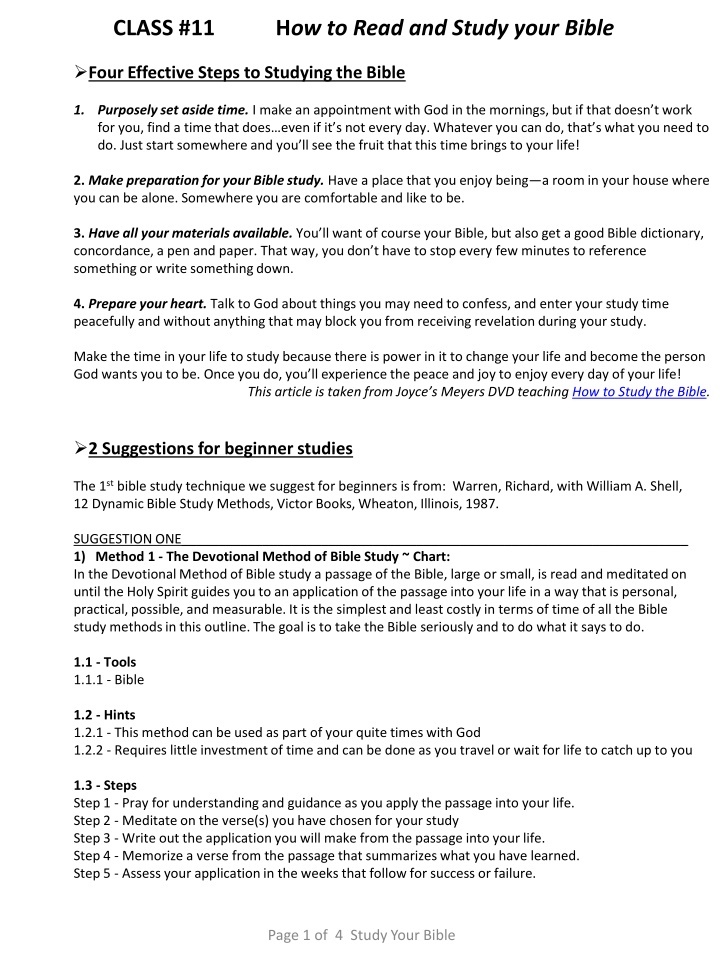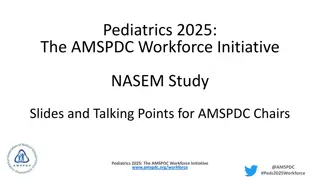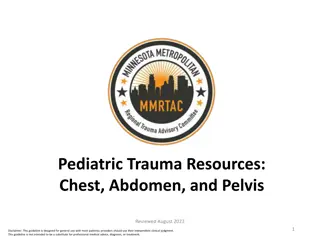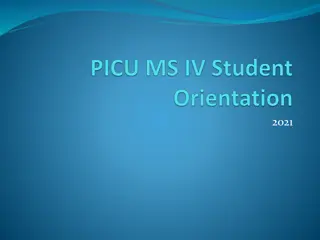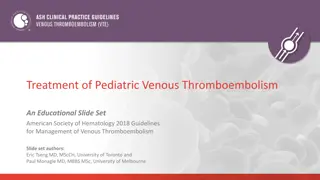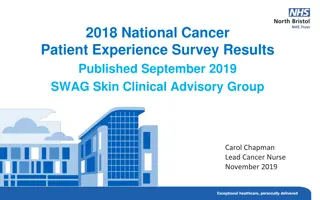Review of Quality of Care for Pediatric Cancer Patients
This study examines the quality of care provided to pediatric cancer patients receiving systemic anti-cancer therapy. The focus is on recommendations to enhance patient outcomes, including multidisciplinary discussions, documentation of treatment intent, and the need for a national consent form specific to SACT.
Download Presentation

Please find below an Image/Link to download the presentation.
The content on the website is provided AS IS for your information and personal use only. It may not be sold, licensed, or shared on other websites without obtaining consent from the author.If you encounter any issues during the download, it is possible that the publisher has removed the file from their server.
You are allowed to download the files provided on this website for personal or commercial use, subject to the condition that they are used lawfully. All files are the property of their respective owners.
The content on the website is provided AS IS for your information and personal use only. It may not be sold, licensed, or shared on other websites without obtaining consent from the author.
E N D
Presentation Transcript
CLASS #11 How to Read and Study your Bible Four Effective Steps to Studying the Bible 1. Purposely set aside time.I make an appointment with God in the mornings, but if that doesn t work for you, find a time that does even if it s not every day. Whatever you can do, that s what you need to do. Just start somewhere and you ll see the fruit that this time brings to your life! 2. Make preparation for your Bible study. Have a place that you enjoy being a room in your house where you can be alone. Somewhere you are comfortable and like to be. 3. Have all your materials available.You ll want of course your Bible, but also get a good Bible dictionary, concordance, a pen and paper. That way, you don t have to stop every few minutes to reference something or write something down. 4. Prepare your heart. Talk to God about things you may need to confess, and enter your study time peacefully and without anything that may block you from receiving revelation during your study. Make the time in your life to study because there is power in it to change your life and become the person God wants you to be. Once you do, you ll experience the peace and joy to enjoy every day of your life! This article is taken from Joyce s Meyers DVD teaching How to Study the Bible. 2 Suggestions for beginner studies The 1st bible study technique we suggest for beginners is from: Warren, Richard, with William A. Shell, 12 Dynamic Bible Study Methods, Victor Books, Wheaton, Illinois, 1987. SUGGESTION ONE_____________________________________________________________________ 1) Method 1 - The Devotional Method of Bible Study ~ Chart: In the Devotional Method of Bible study a passage of the Bible, large or small, is read and meditated on until the Holy Spirit guides you to an application of the passage into your life in a way that is personal, practical, possible, and measurable. It is the simplest and least costly in terms of time of all the Bible study methods in this outline. The goal is to take the Bible seriously and to do what it says to do. 1.1 - Tools 1.1.1 - Bible 1.2 -Hints 1.2.1 - This method can be used as part of your quite times with God 1.2.2 - Requires little investment of time and can be done as you travel or wait for life to catch up to you 1.3 - Steps Step 1 - Pray for understanding and guidance as you apply the passage into your life. Step 2 - Meditate on the verse(s) you have chosen for your study Step 3 - Write out the application you will make from the passage into your life. Step 4 - Memorize a verse from the passage that summarizes what you have learned. Step 5 - Assess your application in the weeks that follow for success or failure. Page 1 of 4 Study Your Bible
CLASS #11 How to Read and Study your Bible Date: Passage: (Check here when you have prayed over this passage) 1. Prayer: 2. Meditation: 3. Application: (How you will apply this passage to your life) 4. Memorization: (Key verse of the passage, for this particular study) 5. Assessment of Application: (Perform this step over the next couple of weeks) Page 2 of 4 Study Your Bible
CLASS #11 How to Read and Study your Bible SUGGESTION TWO_ By Mary Fairchild 1) Start with Prayer Probably one of the most common reasons why Christians don't study the Bible is based on this complaint, "I just don't understand it!" Before you start each study session, begin by praying and asking God to open your spiritual understanding. The Bible says in 2 Timothy 3:16, "All Scripture is God-breathed and is useful for teaching, rebuking, correcting and training in righteousness." (NIV) So, as you pray, realize that the words you are studying are inspired by God. Psalm 119:130 tells us, "The unfolding of your words gives light; it gives understanding to the simple." (NIV) 2) Choose a Book of the Bible In this method you will study an entire book of the Bible. If you've never done this before, start with a small book, preferably from the New Testament. The book of James, Titus, 1 Peter, or 1 John are all good choices for first-timers. Plan to spend 3-4 weeks studying the book you have chosen. 3) Read the Entire Book Next you'll spend some time, perhaps several days, reading through the entire book. Do this more than once. As you read, look for themes that may be woven into the chapters. Sometimes you'll detect a general message in the book. For example, in the book of James, an obvious theme is "Persevering through Trials." Take notes on the ideas that jump out at you. Look also for "life application principles." An example of a life application principle in the book of James is: "Make sure my faith is more than just a statement - it should result in action." It's a good practice to try and pull out these themes and applications on your own as you meditate, even before you begin using other study tools. This gives an opportunity for God's Word to speak personally to you. 4) Zoom In Now you will slow down and read the book verse by verse, breaking down the text, looking for deeper understanding. Hebrews 4:12 begins with, "For the word of God is living and active..." (NIV) Are you starting to get excited about Bible study? What a powerful statement! Now let's see what it looks like under a microscope, as we begin breaking down the text. Using a Bible dictionary, look up the meaning of the word livingin the original language. It is the Greek word 'Za 'meaning, "not only living, but causing to live, vivifying, quickening." You start to see a deeper meaning: "God's Word causes life to come about; it quickens." Because God's Word is alive, you can study the same passage several times and continue to discover new, relevant applications throughout your walk of faith. 5) Choose Your Tools As you continue to do this type of verse by verse study, there's no limit to the wealth of understanding and growth that will come from your time spent in God's Word. For this portion of your study, you will want to consider choosing the right tools to aid you in your learning, such as a commentary, lexicon or Bible dictionary. A Bible study guide or perhaps a study Bible will also help you dig deeper. Page 3 of 4 Study Your Bible
CLASS #11 How to Read and Study your Bible 6) Be a Doer of the Word Don't just study God's Word for the sake of studying. Be sure to put the Word into practice in your life. Jesus said in Luke 11:28, "But even more blessed are all who hear the word of God and put it into practice." (NLT) 7) Set Your Own Pace Once you've finished the first book, choose another one and follow the same steps. __________________________________________________________________________________ The following are some methods of studying the bible that were shared by readers of an online website: Take Sermon Notes for Study Later One way to study the Bible is to take notes while your pastor is teaching or preaching, write the Scriptures down and study on that all week. Studying the Bible by Subject Studying the Bible by subject is the best way to study the Bible. Getting a concordance and looking up a subject as it appears throughout the Bible is the fastest way to get information and it also will be the most motivating because you will get the information quickly. The fact that it was easy, it was more enjoyable, and the more likely you will continue studying more biblical subjects. How to Study the Bible Effectively First, take on the four books of New Testament - Mathew, Mark, Luke and John to discover the role Christ played in the Scripture. Afterward, go back to Genesis and then return to the New Testament. A Scripture a Day I try and read at least one chapter from the Bible a day, and if possible, find a verse or two that I can apply to my life or that has significant meaning to me. I write the verses down on a post it note and put it in places where I'll see it ... like on my mirror. Then, I'll recite and memorize that Scripture throughout the day. That way, I can have a way of really putting Scripture into action and memorizing it. __________________________________________________________________________________ The following online sites are helpful for looking up bible passages, different version, commentaries, Bible Atlas, Concordance, encyclopedia, Dictionary, etc http://www.biblos.com/ http://www.biblegateway.com/ Page 4 of 4 Study Your Bible
